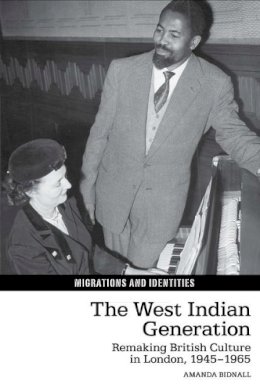
Stock image for illustration purposes only - book cover, edition or condition may vary.
The West Indian Generation: Remaking British Culture in London, 1945–1965
Amanda Bidnall
€ 140.92
FREE Delivery in Ireland
Description for The West Indian Generation: Remaking British Culture in London, 1945–1965
Hardback. The West Indian Generation: Remaking British Culture in London, 1945-1965 shows the progressive potential-and stultifying limits-of cultural collaboration between West Indian artists and entertainers who settled in London and the city's engines of mainstream culture. Series: Migrations and Identities. Num Pages: 256 pages, 6, 6 black & white halftones. BIC Classification: HBLW3. Category: (G) General (US: Trade). Dimension: 239 x 163. .
Between Britain’s imperial victory in the Second World War and its introduction of race-based immigration restriction ‘at home,’ London’s relationship with its burgeoning West Indian settler community was a cauldron of apprehension, optimism, ignorance, and curiosity. The West Indian Generation: Remaking British Culture in London, 1945–1965 revisits this not-quite-postcolonial moment through the careers of a unique generation of West Indian artists that included actors Earl Cameron, Edric Connor, Pearl Connor, Cy Grant, Ronald Moody, Barry and Lloyd Reckord, and calypso greats Lord Beginner and Lord Kitchener. Colonial subjects turned British citizens, they tested the parameters of cultural belonging through their work. Drawing upon familiar and neglected artifacts from London’s cultural archives, Amanda Bidnall sketches the feathery roots of this community as it was both nurtured and inhibited by metropolitan institutions and producers hoping variously to promote imperial solidarity, educate mainstream audiences, and sensationalize racial conflict. Upon a shared foundation of language, education, and middle-class values, a fascinating collaboration took place between popular West Indian artists and cultural authorities like the Royal Court Theatre, the Rank Organisation, and the BBC. By analyzing the potential—and limits—of this collaboration, Bidnall demonstrates the mainstream influence and perceptive politics of pioneering West Indian artists. Their ambivalent and complicated reception by the British government, media, and populace draws a tangled picture of postwar national belonging. The West Indian Generation is necessary reading for anyone interested in the cultural ramifications of the end of empire, New Commonwealth migration, and the production of Black Britain.
Product Details
Publisher
Liverpool University Press
Format
Hardback
Publication date
2017
Series
Migrations and Identities
Condition
New
Number of Pages
296
Place of Publication
Liverpool, United Kingdom
ISBN
9781786940032
SKU
V9781786940032
Shipping Time
Usually ships in 7 to 11 working days
Ref
99-50
About Amanda Bidnall
Amanda Bidnall is an independent scholar, writer, and editor.
Reviews for The West Indian Generation: Remaking British Culture in London, 1945–1965
Reviews 'Engaging, informed, sophisticated, lucid, detailed - a worthwhile historical contribution that shows how the present day state of the nation grew from its deep roots in the arts and lives of the postwar years among Caribbean settlers to Britain.' Leon Wainwright, Open University 'The year 2018 marks the 70th anniversary of the 1948 voyage of the Empire Windrush from Jamaica to Britain, a voyage often credited with marking the beginning of mass Commonwealth immigration. This book contextualizes that event in two ways. It shows that many thousands of imperial migrants came to Britain for war service, and that Windrush was continuing existing patterns. While acknowledging subsequent severe prejudice, Bidnall (independent historian) goes beyond alienation and conflict in tracing this history. She argues convincingly that West Indians’ culture "was not a wholly alien one ... it was ... profoundly shaped by the colonies' centuries-long connection to Britain" (as she writes in the introduction)—which is to say, West Indians knew British customs, language, and literature. Numerous West Indian visual artists (e.g., Ronald Moody), actors and radio performers (Edric Connor), musicians (calypsonians Lord Invader, Lord Kitchener), and writers sought success and acceptance in England, and many achieved it. The BBC’s diverse programming and wide reach played a crucial role. Resistance through cultural politics intensified later, with the rise of black nationalism and colonies winning independent nationhood. Bidnall’s book does not supplant standard race-relations narratives, but it fruitfully expands and advances debate' T. P. Johnson, CHOICE
